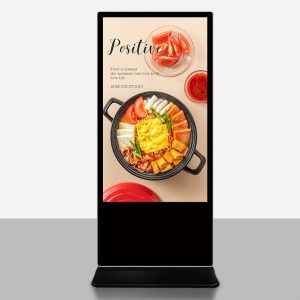-
-41%
 Select options This product has multiple variants. The options may be chosen on the product pageQuick View
Select options This product has multiple variants. The options may be chosen on the product pageQuick ViewFloor standing digital poster display, kiosk signage system
$999.00 – $3,299.00
Freestanding Digital Posters kiosks
Freestanding Digital Posters are one of the first technologies to be introduced in the digital signage industry. That does not mean that it’s redundant mind you. These portable all-inclusive displays have evolved with changing technologies, in both, management and aesthetics.
The screens have become brighter with accurate color representation. Back-end management has extended to mobile phones, which makes it possible to update one of these from anywhere in the world.
If anything, the upgrades have made them all the more popular among advertisers who seek portability and ease of use.
But, if you are reasonably new to all-in-one digital signage displays and want to know more about freestanding digital posters, then sit back and enjoy this read.


What are freestanding digital signage posters?
Freestanding posters are an all-inclusive vertical digital display system that comes with a high-resolution LCD screen that’s powered by an LED backlight. We mentioned all-inclusive because they come with all necessary components built into a sturdy, metal enclosure. You just need to place it at the intended site and power it on.
These are also available in a wide range of sizes & shapes. The most popular sizes manufactured by DigitalFrame0 range from 32" to 65”.
As implied by the term ‘Freestanding’, these units are portable, and modern-day ones even come with caster wheels which make it easy to transport them around the site.
Where they are used
Freestanding posters are perfect for displaying in public spaces because of their flexible no-fuss operation and sturdy designs.
They can be used for a variety of purposes, including advertising, promotion announcements, new product releases and way finding.
How they work
Freestanding digital posters are designed for hands-free operation with minimal manual inputs. They feature an HD media player that can be operated through multiple connectivity points. This is model specific, but most displays feature a USB slot as well as an HDMI port.
Once you load the media on to the internal flash memory, you can choose to play them on a loop, or play them at specific timed intervals. For instance, restaurants can play different menus at different times of the day, or different days of the week.
You also have the option to connect the display to a network. This allows you to connect to the network remotely to change the media. Android and Apple compatible software offer complete customization from the convenience of your cell phones.


